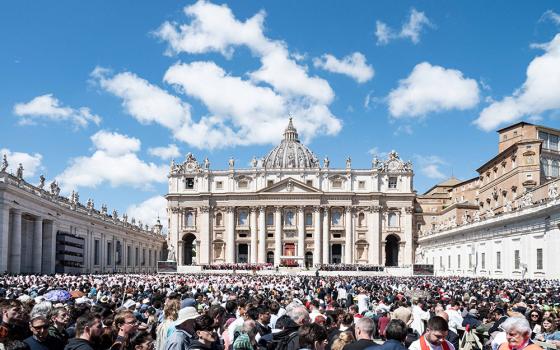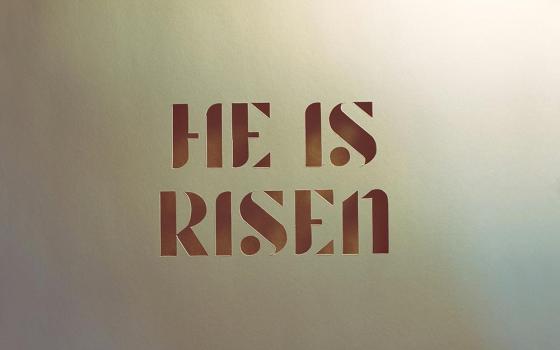
(Unsplash/Ahna Ziegler)
It's hard to believe that the Lenten season is here. Seems like we just ended the Christmas cycle and entered Ordinary Time. Since childhood, I can remember the importance and solemnity of Ash Wednesday as we dutifully received ashes and were reminded that we were dust and would someday return to that state.
I can't recall what I thought about all this as a child, but through the years of adulthood, I began to question the purpose or value of the dark black smudge placed on my forehead. It always amazed me to see the droves of people who determinedly pursued the reception of ashes, and I never quite understood what all the fuss was about! For me, it was participating in the Mass that officially began the season of Lent, not the sacramental ashes.
So what has the reception of ashes come to mean to me? As I ponder this question, I'm not sure when my perception began to change or my appreciation was renewed. Perhaps it was a homily or a Lenten reading, but the true source of my enlightenment is, of course, is the Holy Spirit.
Throughout my working years, I would often attend morning or midday Mass and receive ashes. It was common and comforting to see many coworkers with the same mark of the cross on their foreheads, and somehow this created a sense of unity or bonding with many people I hardly knew. I think my awareness of this unity and oneness was, at the time, overshadowed by a busy life. But in retrospect, I have the graced awareness that this simple sacramental in the form of a cross, does indeed serve to remind me that our common humanity, our "dustness," unites us though the dying and rising of Jesus.
Besides the unifying effect of ashes, I appreciate their witness value as well. Not only do we support each other in our Christian faith, but by demonstrably showing our belief in the Gospel, we are compelled to live its command to love in all our encounters. We Sisters of St. Joseph Associates in Mission, after a three-year consultation process, composed a Direction Statement in which we committed to our "lived expression" of SSJ spirituality "with the dear neighbor, both at the margins, and beside us in the ordinary circumstances of our lives." When I wear the sign of the cross in the form of sacramental ashes, I tell the world that I profess that all-inclusive love for which Jesus longed and prayed for in John's Gospel, "that they may all be one" (John 17:21).
Advertisement
Recently, I heard some news reports regarding the almost worldwide persecution of Christians and how they attempt to practice their Christianity in secret. This has profoundly deepened my great appreciation of my freedom to openly profess my faith and participate in Mass and the sacraments. What a blessing to be able to tell the world, without fear of recrimination, that I am a Christian, that I believe in the good news of the Gospel, and that I do acknowledge the cross of Jesus Christ by wearing the sign of the cross on my forehead.
But the sacramental ashes are only an outward sign to remind me of its deeper purpose and meaning: my need for renewal, repentance, conversion and transformation through the life, death and resurrection of Jesus.
After my morning meditation, one of the closing prayers I pray is David Fleming's version of the Soul of Christ (Anima Christi). Three lines carry me into this Lenten season:
May your passion and death be my strength and life.
May the shelter I seek be the shadow of your cross.
On each of my dyings, shed your light and your love.
Jesus, through this special season of Lent, does invite me to recommit to God's transformational process, which always involves my letting go, my surrender, and my "yes" to self-emptying love in service of the "the dear neighbor … so that all people are treated with dignity and respect." This is the imperative of our Sisters of Saint Joseph Associate in Mission Direction Statement, and for me — if it is Jesus' kind of love and service — it requires a lot less ego and much more authentic, sacrificial, self-giving love.
After the ashes wear off, how can I keep the awareness of the commitment to this call to transformation, this personal invitation to the self-emptying, sacrificial love of Jesus? For me, besides the church's threefold admonition of prayer, fasting and almsgiving, I will revisit the profoundly inspirational words of wisdom from Fr. Medaille, the founder of the Sisters of Saint Joseph, as simply stated in the 100 maxims he gave us in 1650. Their purpose is "… to help the Sisters of Saint Joseph and their Associates grow in love of God and neighbor, to consciously place their ego in the service of love, and to grow in freedom to choose the greater good in all their actions and relationships."
I think I'll begin with the following (maxims 6, 46, 61 and 98):
Shed old ways that keep you self-centered. Embrace love. Be love.
Let the false self and its vanity die out. Be attached to God and God's dream for you.
Seek union with God and let that pure love transform you.
Suffering touches everyone. Unite yours to God and all who suffer.
Lent is a very long season, and its penitential character can become routine, mundane and commonplace. I am hopeful and optimistic that my choosing even one maxim a day will keep alive my awareness of the singular opportunity Lent offers me to "respond with courage and compassion" (Sisters of Saint Joseph Direction Statement) to the Gospel love to which we are called.
[Judy Principe is an associate of the Sisters of St. Joseph, Philadelphia. Her professional career was spent in training and development, organizational development and human resources. She holds a master's degree in management and supervision and a certificate in organizational development.]







